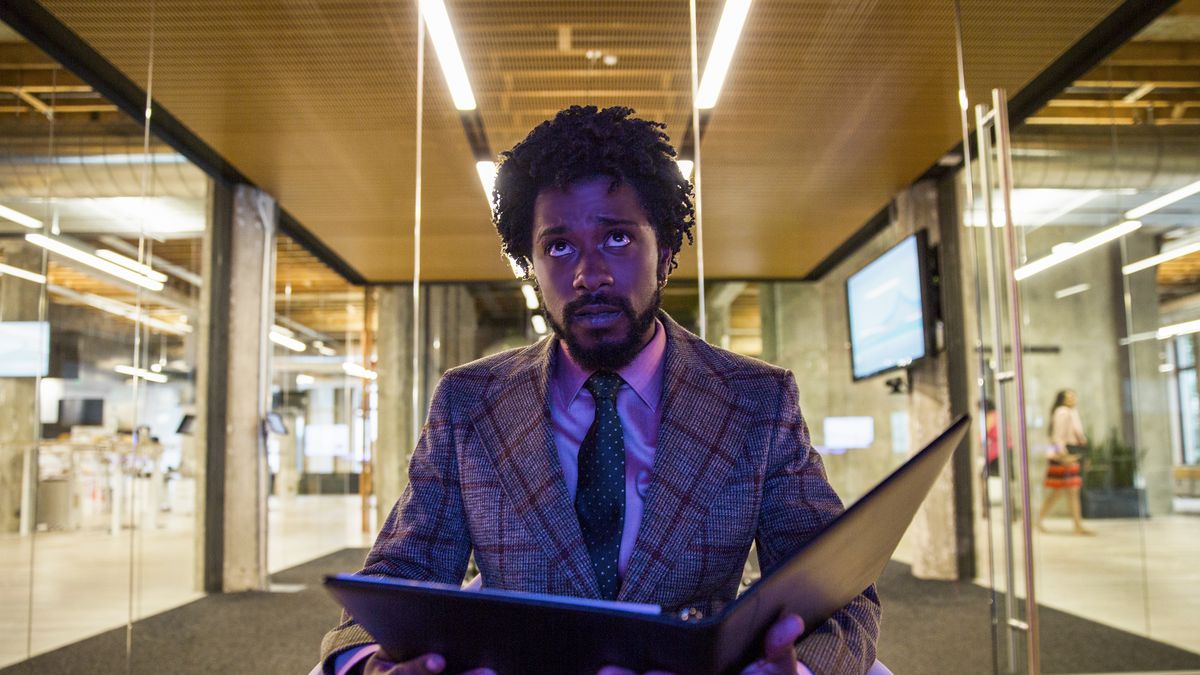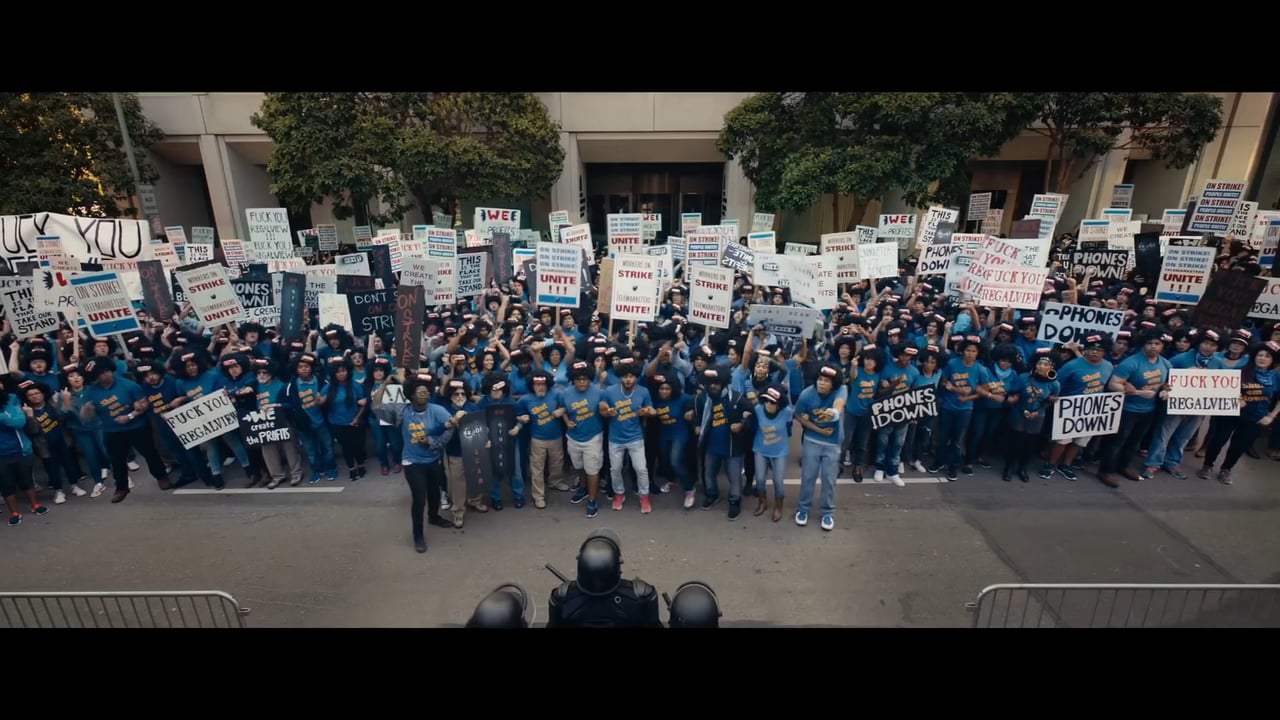Boots Riley‘s sense of humor has always tended to the pointedly outlandish, indignant outrage paired with a much goofier sensibility. Case in point: the class-conscious dance track “Five Million Ways To Kill A CEO” from his legendary Oakland hip-hop ensemble The Coup, in which Riley, voice swaggering over the groove, lays out the case against a ruling class who “own sweats shops, pet cops and fields of cola / Murder babies with they molars on the areola,” before suggesting a number of ways to rectify the situation. Physical attacks and work stoppages are invoked, but there’s also turning the boss’ greed against him by telling him “that boogers be sellin’ like crack / He gon’ put the little baggies in his nose and suffocate like that.” Sorry To Bother You, Riley’s celebrated debut film, draws on both the militant and the very silly in a similar way. The result is the definition of an ambitious mixed bag, which is to say, it’s a must-see.
Sorry To Bother You‘s plot involves the working-class trials and tribulations of Cassius Green (Lakeith Stanfield, all off-kilter shamble and weirdo charisma); the gleefully unsubtle, “fuck it, that’s going in!” aspect of his name serves as a hint at the film’s more general aesthetic and approach, which works more often than not. Like Riley, Cassius is an Oaklander, though unlike Riley (I think), he lives in his uncle’s (Terry Crews) garage. Hard up for money, he takes a job at a telemarketing outfit called RegalView, an absurdist class microcosm where the grunts toil away in the basement under a sign bearing the firm’s motto – Stick To The Script, hilariously presented as the awkward acronym “STTS” — while the execs and “Power Callers” ride a gold elevator to a nebulous “upstairs”.
 Cassius’ early failures to make a sale are some of Sorry To Bother You‘s funniest bits, as Riley plops his protagonist and his desk down, as if by magic, in the living rooms of his would-be marks. No one is having it, or even staying on the line, until a fellow worker (Danny Glover) advises him to use his “white voice”. By projecting not just whiteness but aspirational whiteness — a voice, thick with conspiratorially chummy good humor and carefree, entitled ease that white people wish they had, and sometimes do, underscoring the constructed nature of “whiteness” in the first place — the sales start soaring, and the film’s racial satire is off and running.
Cassius’ early failures to make a sale are some of Sorry To Bother You‘s funniest bits, as Riley plops his protagonist and his desk down, as if by magic, in the living rooms of his would-be marks. No one is having it, or even staying on the line, until a fellow worker (Danny Glover) advises him to use his “white voice”. By projecting not just whiteness but aspirational whiteness — a voice, thick with conspiratorially chummy good humor and carefree, entitled ease that white people wish they had, and sometimes do, underscoring the constructed nature of “whiteness” in the first place — the sales start soaring, and the film’s racial satire is off and running.
Cassius’ success propels him through the ranks to Power Caller, puts him at odds with his friends downstairs (Jermaine Fowler‘s Salvador and Steven Yeun‘s Wobbly-like rabblerouser Squeeze) who are organizing for increased wages, strains his relationship with his performance artist girlfriend (a very good Tessa Thompson, sporting instantly iconic accoutrements), and causes nothing short of an existential crisis. For a Black man in Oakland who now sounds (exactly) like David Cross, selling all manner of evil commodities to international gangsters and being celebrated for it, it’s a world turned upside down.
Of course, that’s not even the half of it, thematically or narratively, and in case no one has spoiled Sorry To Bother You‘s mid-film pivot to out-and-out absurdism for you yet, I won’t be the one to do it. Still, the roots of that later madness are all tangled up in the film from the start: Riley juggles tones and throws out manic jokes like only a first-time director can, and there’s an infectiousness to its lunatic energy. Some jokes don’t land at all (I’m sorry, but saying “40 on number 2” at the gas station and leaving 40 cents is pretty weak) and others made me giggle way more than they should’ve (I could’ve watched people plug in the apparently 75-digit secret code into the gold elevator for even longer). The “surrealist” shorthand has been thrown out a bunch, but Sorry To Bother You would seem much more at home alongside the works of Tristan Tzara (or, more appropriately, Robert Downey Sr.) than Dali and his descendants. That makes for a sometimes uneasy pairing with Riley’s Marxism, but perhaps that’s what the absurdity of the Black experience of late capitalism requires.
 The film’s final pedagogical thrust emphasizes the importance of collective action rather than attempting to beat the bastards at their own game; even the most damaging revelations Cassius presents to the public are quickly recuperated by capital. The revolution still will not be televised. Here, Riley draws on some familiar images and sounds: the recent experiences of Occupy Oakland, in which he was something of a de facto public face, hang heavy over the film’s Oakland streets and scenes of pitched confrontation. There’s a rich engagement between screen and street throughout Sorry To Bother You: not just shoutouts to recognizable locales like the downtown buildings, The Layover where they get drinks, or the Grace Beauty Supply sign hanging over Broadway, across the street from where Thompson’s character stages her post-art performance, a block off from the 19th St. station, along a corridor through which we ran through tear gas late at night not very long ago.
The film’s final pedagogical thrust emphasizes the importance of collective action rather than attempting to beat the bastards at their own game; even the most damaging revelations Cassius presents to the public are quickly recuperated by capital. The revolution still will not be televised. Here, Riley draws on some familiar images and sounds: the recent experiences of Occupy Oakland, in which he was something of a de facto public face, hang heavy over the film’s Oakland streets and scenes of pitched confrontation. There’s a rich engagement between screen and street throughout Sorry To Bother You: not just shoutouts to recognizable locales like the downtown buildings, The Layover where they get drinks, or the Grace Beauty Supply sign hanging over Broadway, across the street from where Thompson’s character stages her post-art performance, a block off from the 19th St. station, along a corridor through which we ran through tear gas late at night not very long ago.
Not just that. Riley sometimes constructs Oakland as a shadow realm of possibility and intrigue: as in Ryan Coogler‘s superhero flashback, we’re never far from an awareness that this is “the land where the Panthers grew / You know the city and the avenue.” And other times, the Town is portrayed more like the locus of absurd contradictions that it also is; Riley didn’t need to create the homeless tent cities that line many Oakland streets for his tracking shots, for instance, because those tent cities are really there. Displacement and gentrification and the routine economic violence of white supremacy, all part and parcel of Sorry To Bother You, are crisis norms in the shadow of a downtown cop station that looks like it belongs in Gotham. It can be a weird fucking place, Oakland, and Sorry To Bother You stakes a solid, kaleidoscopic claim as its weird fucking movie.

